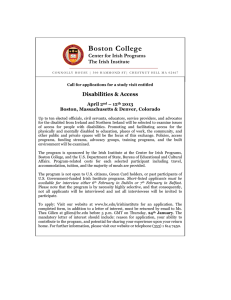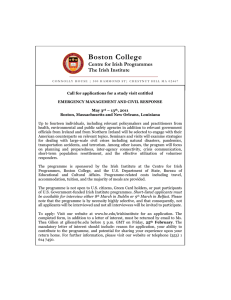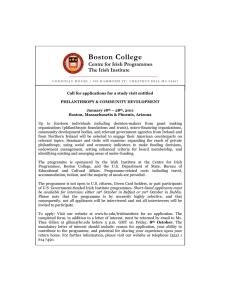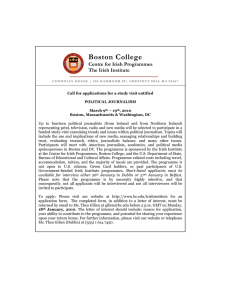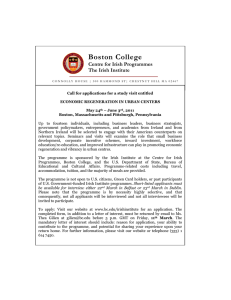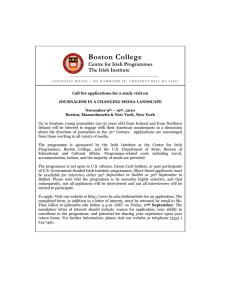E F S
advertisement
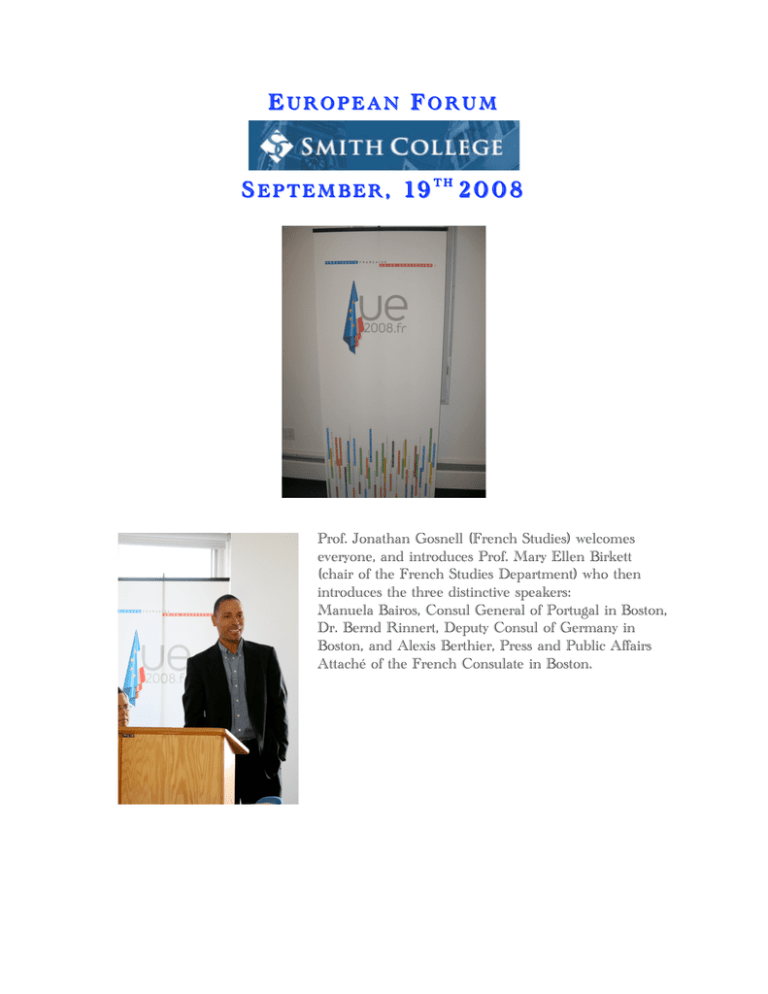
EUROPEAN FORUM S E P T E M B E R , 1 9 TH 2 0 0 8 Prof. Jonathan Gosnell (French Studies) welcomes everyone, and introduces Prof. Mary Ellen Birkett (chair of the French Studies Department) who then introduces the three distinctive speakers: Manuela Bairos, Consul General of Portugal in Boston, Dr. Bernd Rinnert, Deputy Consul of Germany in Boston, and Alexis Berthier, Press and Public Affairs Attaché of the French Consulate in Boston. Alexis Berthier, Manuela Bairos, and Dr. Bernd Rinnert European Union Rep resentatives Discuss New Challenges New Presidential Term Brings Change s to the European Union Smith College Welcomes European Union Deputies By Christiana Solano Consuls from the European Union (EU) arrived on the Smith campus last week to hold an open forum, at which they discussed issues affecting the EU, presented its current goals and welcomed questions from the audience on a wide range of topics. The forum, held Sept. 19, featured a panel of Press and Public Affairs Attaché at the Consulate General of France in Boston Alexis Berthier, Consul General of Portugal in Boston Manuela Bairos and Deputy Consul General for Germany in New England Bernd Rinnert. Berthier opened the evening by stating, “I hear that Julia Child went here, so this is a good place.” He continued by commenting on the status of the EU among American media and citizens, saying, “In the U.S., Europe is well-known throughout as individual countries. When you speak about the European Union in blogs and media, the EU is at best misunderstood, and at worst, totally unknown. It’s seen as a bureaucratic organization with archaic procedures.” After outlining the term goals of the French presidency, one of which is to eliminate the rotating presidency system, the conversation turned to the Lisbon Treaty, an agreement that would streamline the EU’s infrastructure, extending the presidency to two and a half years and eliminating the current pillar system. Berthier noted the importance of the Treaty’s proposal for a more permanent presidential system, stating, “People cannot put a face on the EU, and it’s important to have a figure who can embody it for foreign relations and interior reasons as well. It’s hard to find someone to take into consideration.” By current EU standards, the treaty cannot go though without unanimous support, which it does not have due to the Irish referendum. After mentioning personal support for the EU, an audience member of Irish nationality noted that in Ireland, where the Lisbon Treaty was rejected by voters on July 12, the European Union is “seen as a very godless organization,” and mentioned that the secular nature has made Irish citizens refer to it as “the antichrist.” Bairos referred to the reasons behind the secular nature of the Union, stating, “They were thinking of mentioning Judeo-Christian values, but this was rejected because it’s a secular organization. This is an open organization, not a Christian club like people say.” The process of Turkey’s inclusion has proven both controversial and a testament to the inclusive nature of the EU. “Bringing Turkey along, a country with a different religious background than ours, will be a defining moment. Even our history books are different, theirs beginning with the conquest of Constantinople, ours beginning with the fall. Maybe the textbooks have to change, and some people are uneasy with this.” To which the same audience member responded with a smile: “You’re right, but you’ve got a long way to go with the Irish.” In light of the recent conflicts in Georgia, the Union sits uncomfortably between a desire for political stability and a dependence on Russia’s natural resources. An official EU statement confirmed that the Georgian crisis is placing relations between Russia and the EU at a “crossroad,” and although EU leaders have agreed to suspend trade developments with Russia, they remain locked in an economic alliance. Rinnert responded to the Russian question with candor. “The honest answer? As long as we depend to such an extent on the energy coming from that huge country... Look, they are a difficult partner. We don’t have any choice but to negotiate with them, to convince them that it is in their best interest to be a good partner.” He paused, continuing, “But this doesn’t mean that we would sacrifice our values to get cheap natural gas.” He then joked, “On a night like this in Moscow they would be drinking vodka by the glass.” But concerning the future of the otherwise relatively stable EU, Rinnert remained positive, saying, “For me the EU is the biggest success story in Europe in the last 50 years. France and Germany have fought two terrible wars, and here we are. The closest of friends.” http://media.www.smithsophian.com/media/storage/paper587/news/2008/09/25/News/S mith.College.Welcomes.Three.European.Union.Representitives-3453161.shtml

